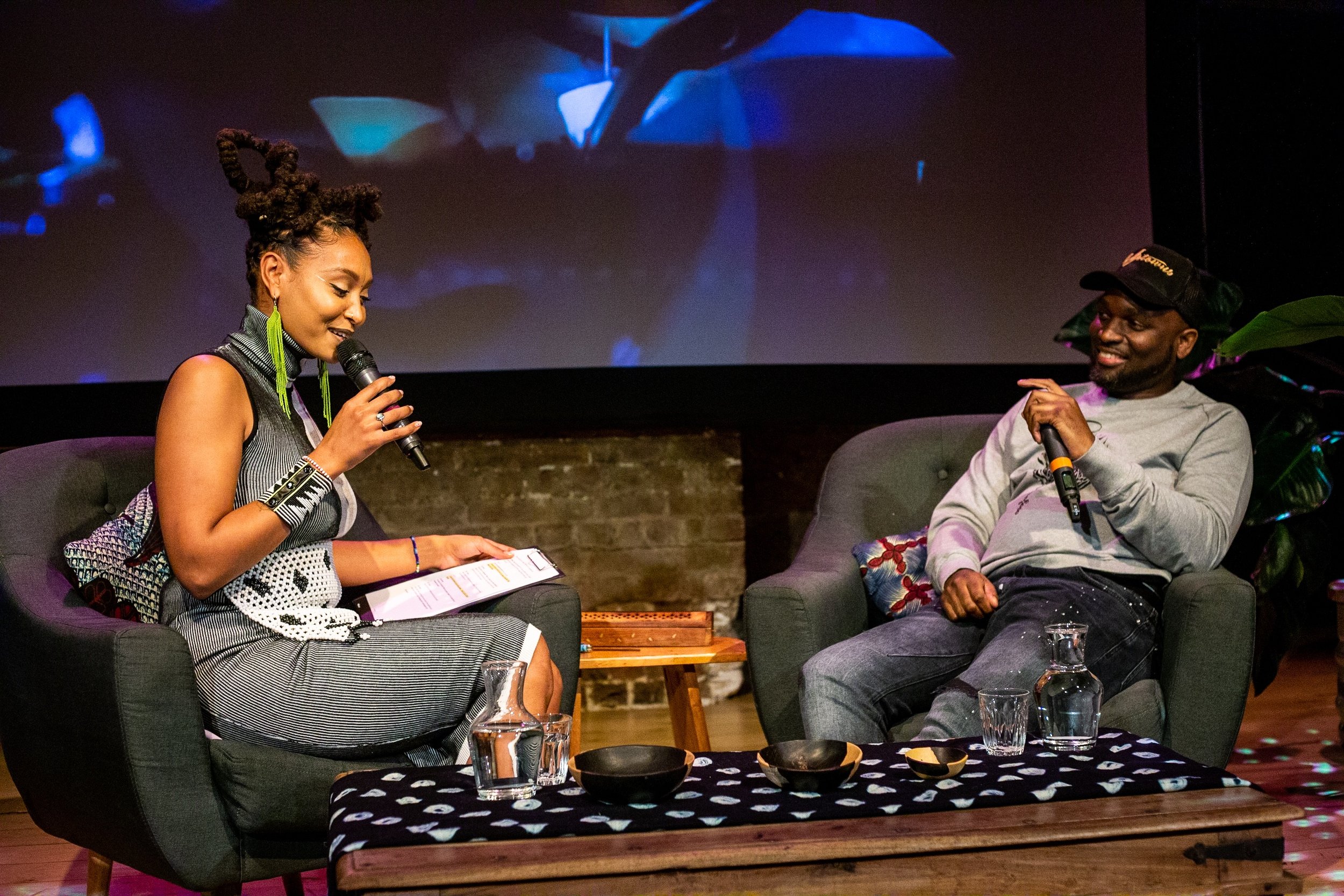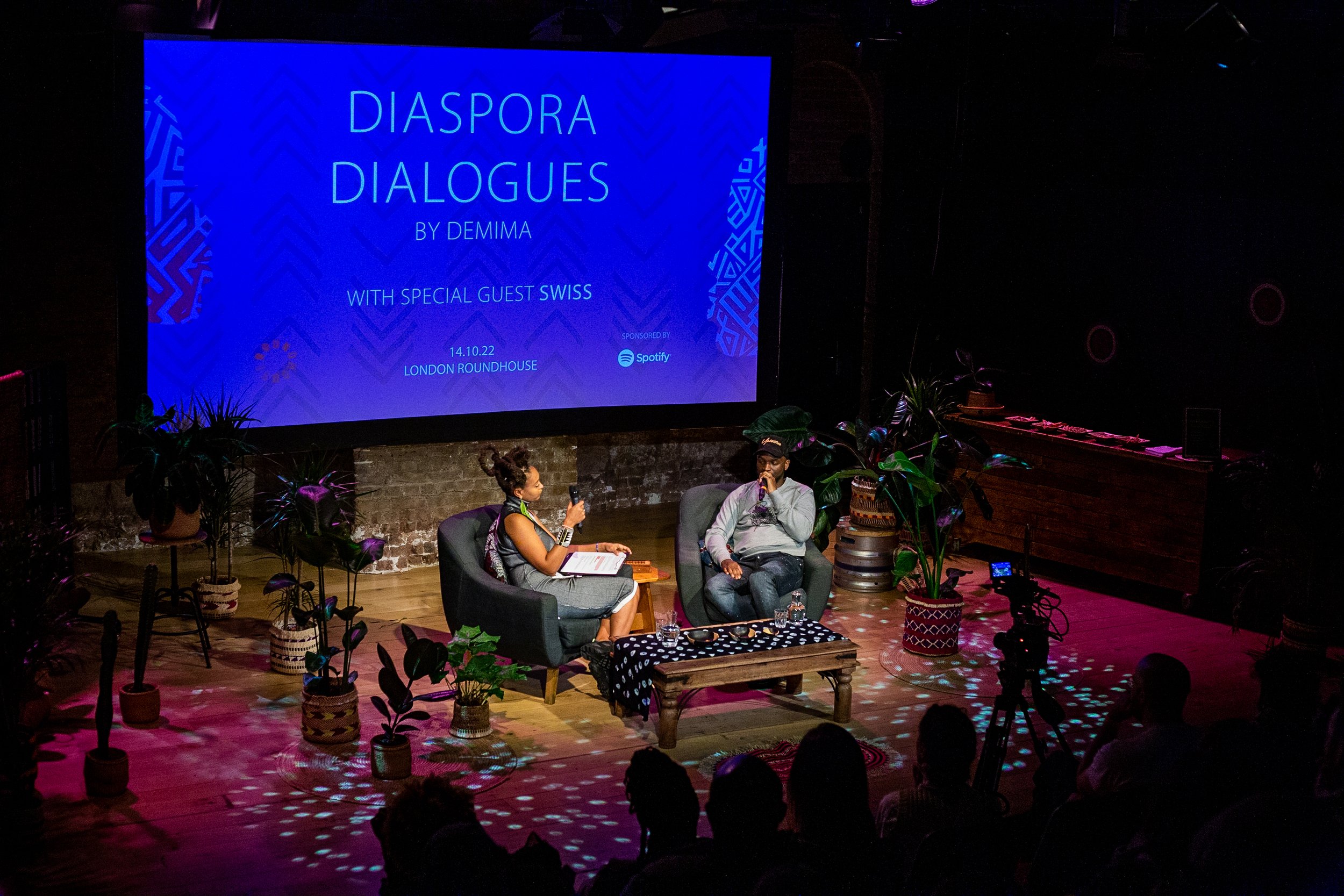Honouring Our Lineages: Diaspora Dialogues
Image: Abdulisms
There is something astoundingly beautiful in the honouring of one's lineage. In all of us, there is a link: a tie to our history that is intrinsically tethered to who we are, and the ways in which we have become.
It is why, perhaps, that Diaspora Dialogues so effortlessly emulates the love, honour and recognition that our roots so deserve. A live podcast series sponsored by Spotify, Diaspora Dialogues is an intimate, multi-sensory series of conversation, sound selection and food, exploring and honouring the depths of African identity, ancestry and migration through the lens of the Artist. Created and hosted by musician, poet and yogi DemiMa Nokusa Mseleku, this evening’s instalment at The Roundhouse, London, seeks to expand the UK's cultural narrative.
Image: Abdulisms
Bathed in purple light, gentle chatter, and surrounded by a selection of wonderfully hand woven plant pots by Ufundi, a collective of women from Kenya, DemiMa took the stage. “This is to honour us as creatives of the diaspora,” DemiMa began, “to honour our individual lineages and cultures. It’s so often that we watch artists perform, but it’s not very often that we get to hear their stories.”
Joining DemiMa was rapper and entrepreneur Swiss, a formidable influence on the UK music scene as a producer, writer and MC for So Solid Crew. “I’m half-Jamaica, half-Bajan but I didn’t grow up with my Bajan side, so everything I’ve known growing up is Jamaican,” explained Swiss. “There’s nothing like being in Jamaica… climbing trees, being free, getting bitten by red ants, eating guineps out of the trees. It’s just Jamaica, init!” Swiss laughed. “It’s home!” DemiMa added: “Connecting to your roots is priceless. It’s so important to understand who you are; to move through life knowing where you come from.”
Image: Abdulisms
During the show, we went on a musical journey with Swiss as he recounted the songs that moulded him into the successful rapper that he is today. As the sweet tones of Hello Mama Africa by Garnett Silk played out into the space, Swiss explained: “I always liked how Jamaican artists kept that connection with Africa. Listening to these artists, who were icons of our culture, singing to Africa about the motherhood that it represented to them, created a connection within us to Africa as well.”
As the night went on, DemiMa moved us towards the conversation of identity, explaining: “Something I like to do within Diaspora Dialogues is to try to understand the artist's sense of belonging in the UK. Do you identify as British?” The audience laughed as Swiss let out a long sigh. “I feel like I will be forever negotiating that with myself.” DemiMa looked intrigued by his response, going on to add: “Did Britain make you feel welcomed?”
Image: Abdulisms
“No.” Swiss replied after a moment. “No one ever said, ‘Welcome to Britain, we love you just like we love ourselves.’” Swiss went onto recount the first time that he received racial abuse as a child from a white woman on his estate. “It was the first time I identified that I was different. At that moment, she (the racial abuser) broke the fabric of the invisible connection that I had with her as an elder. Lots of other connections were broken in that one exchange.” On how this affected his music, Swiss added: “People say to me, ‘Hey, Swiss, have you noticed a lot of your records have the underlying messages of identity, racism, and cultural identity?’ And, I do really realise that now. So I thought, if that’s the case, then where does this come from? And, my mind immediately went back to that first racist interaction.”
As Swiss began to open up, we learnt about some of his achievements with Black Pound Day. What first started as a response to the death of George Floyd, has now evolved into a fully fledged store inside the biggest shopping centre in Europe. Everything on sale in Black Pound Day has been made by black businesses, and is opened seven days a week in Westfields, White City, London.
Image: Abdulisms
As the evening came to a close, DemiMa finished by asking Swiss about his connections to African spirituality, to which Swiss responded:. “When you look at Africa, you realise how far back we set up kingdoms; writing, scripts, religious reverence, and how we moved so closely with nature. Most of the infrastructure that we have in any society today, you will find that it originated in Africa… This world is a lot more mysterious than we think it is, and that’s fascinating me — and I became a student of that. I continue to learn as much as I can.”
The night ended in a newfound sense of connection and community. As guests and hosts danced to the Zulu beats at the bar, it felt that we had taken a collective step forward in the never ending journey of enlightenment and appreciation of all things diaspora. Honouring ourselves, and our lineages, in a culmination of insightful conversation and creative joy.
Diaspora Dialogues was part of a series at The Roundhouse: PROCESS - events that interrogated artistic processes that centred care, creativity and collaboration. Roundhouse’s year-long theme of Liberation culminates in their spring season of possibilities: FUTURES. Through conversation, performance, visual art, installations, film and audio, FUTURES invites you to contemplate the present, reflect on the past and conceive routes forward for a world in need of change.
For full details on their upcoming events, see here.





